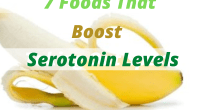10 foods that deplete serotonin in your body – Serotonin is a neurotransmitter that helps regulate mood, social behavior, appetite, digestion, and sleep. It is often referred to as the “happy chemical” because it plays a role in how we feel emotionally. A serotonin deficiency can cause feelings of sadness, irritability, anxiety, depression, insomnia, and fatigue.
There are many different ways that serotonin levels can be depleted in the body. One way is through diet. Certain foods can deplete serotonin levels and lead to symptoms of depression.
What are the Symptoms of Low Serotonin Levels?
When it comes to neurotransmitters, serotonin is one of the most important. It’s responsible for regulating mood, appetite, sleep, and more. Low serotonin levels can lead to a number of problems and symptoms, including:
-Anxiety
-Depression
-Irritability
-Poor sleep quality
-Loss of appetite or overeating
–Fatigue
-Headaches
-Memory problems
-Low self-esteem
-Difficulty concentrating
-Changes in sexual desire or function

10 Foods That Deplete Serotonin Levels
Consuming large amounts of simple carbohydrates such as sugar can deplete levels of serotonin in the body. Other foods that have been linked to lower levels of serotonin include alcohol, caffeine, processed meat, and some artificial sweeteners. While it’s important to limit these foods in your diet, it’s also essential to eat a variety of healthy foods that support optimal serotonin levels. These include complex carbohydrates, healthy fats, protein-rich foods, and foods high in vitamins and minerals like B vitamins, magnesium, and zinc.
1. Sugar [1]
2. Alcohol [2]
3. Caffeine
4. Processed Meat
5. Artificial Sweeteners
6. Refined Grains/Carbohydrates
7. Trans Fats
8. Excessive Salt Intake
9. High-Fat Meats
10. Deep-Fried Foods
Alternatives to These Foods
When it comes to foods that deplete serotonin levels in your body, there are plenty of alternatives out there. Here are just a few:
Fish
While some types of fish are high in omega-3 fatty acids, which can actually help increase serotonin levels, others are high in mercury and other toxins that can deplete them. Choose wild-caught fish over farm-raised whenever possible, and avoid those high in mercury, such as swordfish, tilefish, shark, and king mackerel.
Poultry
Chicken and turkey are both excellent sources of tryptophan, an amino acid that’s essential for serotonin production. However, they also tend to be high in unhealthy fats and cholesterol. To get the benefits of tryptophan without the drawbacks, opt for leaner cuts of poultry like chicken breast or turkey breast.
Eggs
Like poultry, eggs are a good source of tryptophan. But they also contain cholesterol and saturated fat. If you’re going to eat eggs, make sure they’re part of a healthy overall diet and limit your intake to no more than three per week.
Dairy
Dairy products contain calcium and vitamin D, both of which are necessary for serotonin production. However, they can also be high in fat and calories. Choose low-fat or nonfat dairy options whenever possible, and moderate your intake overall.
Nuts and seeds
Nuts and seeds are rich in healthy fats, minerals, and even some B vitamins. However, many types are also high in calories, so be sure to practice portion control. Additionally, those with nut allergies should avoid them altogether.
Tips on Maintaining Healthy Serotonin Levels
Serotonin is a neurotransmitter that plays a role in mood, social behavior, sexuality, and appetite. It’s sometimes referred to as the “happy chemical.” Low levels of serotonin are linked to depression, anxiety, and other mental health disorders.
There are a number of ways to maintain healthy serotonin levels. Here are some tips:
1. Eat foods that contain tryptophan. Tryptophan is an amino acid that’s needed to produce serotonin. Good sources of tryptophan include eggs, fish, meat, poultry, nuts, seeds, and legumes.
2. Get enough vitamin B6. Vitamin B6 is needed for the conversion of tryptophan to serotonin. Good sources of vitamin B6 include poultry, fish, whole grains, and bananas.
3. Get enough folate (vitamin B9). Folate is needed for the synthesis of serotonin. Good sources of folate include leafy green vegetables, legumes, nuts, and seeds.
4. Get enough omega-3 fatty acids. Omega-3 fatty acids are thought to increase levels of serotonin in the brain by reducing inflammation. Good sources of omega-3 fatty acids include fatty fish (such as salmon and tuna), flaxseeds, chia seeds, walnuts, and soybeans.
5. Avoid or limit foods that deplete serotonin levels in your body such as alcohol and sugary foods .
6. Exercise regularly. Exercise has been shown to increase serotonin levels in the brain.
7. Spend time in the sunlight or take a vitamin D supplement. Vitamin D is essential for serotonin production and can be obtained from spending time in the sun or taking a vitamin D supplement.
8. Practice relaxation techniques such as yoga or meditation to help reduce stress and improve mood.
Conclusion
We hope this article has helped you understand which foods to avoid in order to maintain healthy levels of serotonin in your body. Remember that these tips will only be effective if accompanied by other lifestyle changes such as regular exercise and getting plenty of restful sleep. Additionally, make sure to reach out for support from friends or family if you are feeling overwhelmed or down – talking about it can do a world of good! Finally, don’t forget the power of positive thinking – it may help lift your spirits more than any diet change ever could.









